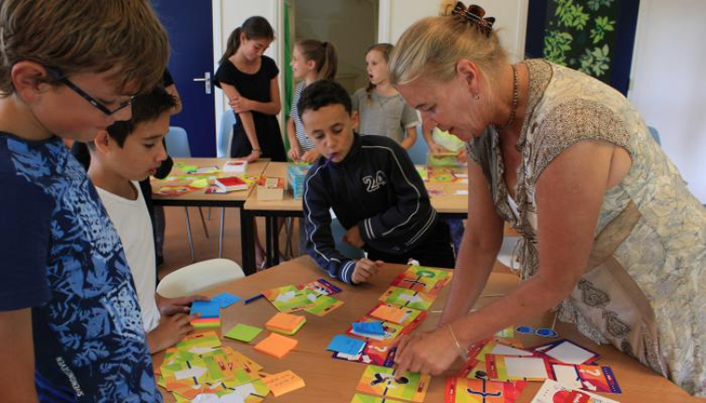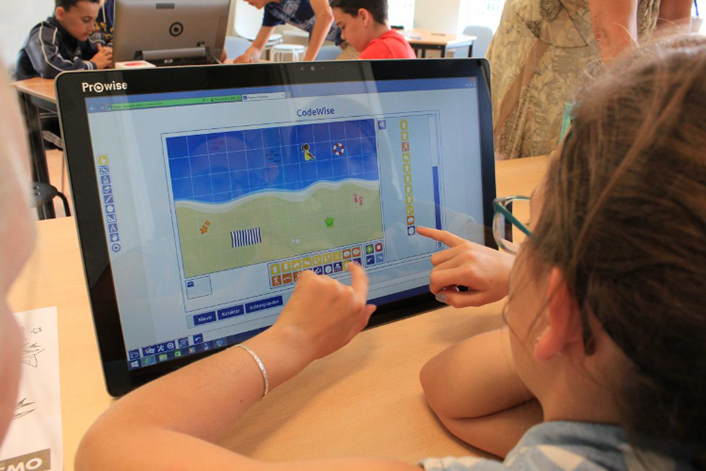
When EDUCAUSE President John O’Brien was recently introduced to Pauline Maas, inventor of the CodeWise game, he was not only impressed by her work — he felt compelled to spread the word about it.
“Crafting code may well be a fundamental element of 21st century literacy, and the idea of making this skill accessible to anyone, including those without computers, is incredibly inspiring,” O’Brien said. “A game like this could be the difference between a future of poverty and prosperity.”
Designed for children, CodeWise introduces coding via a very accessible and affordable method: playing cards.
“Children are very open to it, and teachers are enthusiastic about it,” Maas has said. Those initially intimidated by the idea of teaching coding to young students on computers are especially pleased to have a more analog means of communicating the concepts.
The intersection of technology and accessibility in education has long been of interest to educators. When gamification can be integrated into a curriculum without significant expense or technical expertise, it could open up possibilities for students around the world.

The intersection of tech and accessibility in education has long been of interest to educators; when coding can be integrated into a curriculum without significant expense or technical expertise, it could open up possibilities for students around the world.Once students have grasped the basic tenets of coding with CodeWise cards, they can continue to advance their programming skills with a computer-based game.
Maas arrived at the idea after having spent a dual-faceted career in ICT (information communications technology) training and in K-12 teaching.
She had entered the male-dominated field almost by accident. The textile arts graduate was having a difficult time landing a teaching role in her home country of The Netherlands when she took up an administrative role at a local company. “The small mainframe we had often broke down,” Maas recalled, grinning at the memory. “After a while, I asked the technician who would come to show me how to repair it.” The repairman suggested to start working in computer science, and so she did in the beginning of 1980. The rest, as they say, is history.
Before the call to coding became a global battle cry — and at a time when women were exceedingly scarce among computer science majors — Maas was herself a pioneer. Her inspiration for CodeWise came when she noted that her four children weren’t interested in coding. Knowing that the skills one learns are highly transferable to other professional roles, Maas felt strongly that a non-technological solution was the answer.
Thinking about writing code as building blocks for an action, Maas began to assemble and illustrate what a game might look like. “My goal was to get kids engaged, and remove the initial hurdle…the things that appear to be complicated that might prevent them from learning the concept altogether,” Maas said.
The result: a colorful card game that enables kids to ‘program’ each other’s actions. Kids assemble into teams, arranging the cards in a sequence that includes if-then statements, repetitive actions, and other commands well known in the programming world.
“Children are so creative, and we’ve witnessed this firsthand in their interactions with one another while playing CodeWise,” Maas said. “In minutes, they come up with new ideas and scenarios that may be beyond our imagination as adults. It’s wonderful.”
The game, which has been played by children in The Netherlands, Antilles UK and Germany is now available through ProWise, a company that has developed technological interface for kids to use that builds off of CodeWise once they ‘graduate’ from the card game.
Maas is now working to develop a second game for the company, which will be announced in early 2017. Although she can’t talk about it officially, her excitement is palpable. “My hope — and my belief — is that this will be another incredibly valuable and fun educational game for kids,” Maas said.
Kristi DePaul of Founders Marketing provides editorial support and regular contributions to the Transforming Higher Ed column of EDUCAUSE Review on issues of teaching, learning, and edtech.
